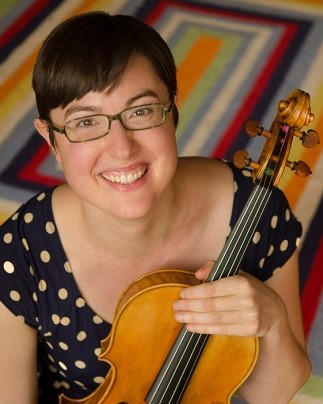Alumni Spotlight: Molly Gebrian ‘06 MM, ‘08 GD

Alumna Dr. Molly Gebrian ‘06 MM, ‘08 GD has distinguished herself as an outstanding performer, teacher, and scholar throughout the US and Europe. Currently the Assistant Professor of Viola at the Fred Fox School of Music at the University of Arizona, one of her biggest passions is understanding how people learn and experience music. Her background in neuroscience gives her unique insight into how the brain learns and how musicians can best use this information to their advantage in the practice room.
She is a frequent presenter on topics having to do with music and neuroscience at conferences and at schools and universities around the country.
In addition, her love of contemporary music led her to collaborate with many composers, often in premieres of works written for her, and she has worked closely with the Ensemble Intercontemporain and Pierre Boulez for performances at the Lucerne Festival.
“NEC shaped how I listen to music, how I interpret music, and the musical possibilities that exist when really amazing players come together and are 100% committed to the music they are playing.”
Join us and register for Molly's Webinar:
what musicians can learn about the science of practicing
Learn what neuroscientists have discovered about how our brains learn, and how to apply these insights to practicing and teaching so that practicing becomes more efficient and effective, leading to enhanced performance ability, enjoyment, and confidence.
Topics include:
- How to get rid of bad habits
- How to make things automatic/reliable on stage
- The role of sleep in learning
- The power of mental practicing
- How to use the metronome to greatest effect
- The benefits of random practice for enhanced performance
Why did you choose NEC?
I chose NEC for its outstanding reputation and because I wanted to study with Carol Rodland. I also grew up in Connecticut and came to Boston in high school to play in the NEC Youth Philharmonic Orchestra, so NEC was always a place I wanted to return to.
What have you been up to since graduating from NEC?
After NEC, I got my DMA at Rice University and then lived in France for a year and Germany for a year. In 2011, I spent the year in Paris to undertake an intensive study of contemporary music with the violist and composer Garth Knox, and in 2012, I was in Stuttgart, Germany teaching at the International School of Stuttgart. I was then a freelancer in Los Angeles for a year before teaching at the University of Wisconsin-Eau Claire. I was the viola professor there and also taught theory and aural skills (and a class on music and the brain) for 5 years.
In 2016, I released my first album called Trios for Two. It features world-premiere recordings of music for viola, piano, and percussion written for myself and my duo partner, Danny Holt (who plays piano and percussion simultaneously).
During the summer of 2020, I led a group of violists in developing a database of music by traditionally underrepresented composers, which is now housed on the American Viola Society website and features nearly 1600 pieces by over 500 composers.
I now teach at the University of Arizona and in addition to all of my performing and teaching, my area of expertise is applying the cognitive neuroscience of learning and memory to practicing and performing. I write and present frequently on these topics, particularly during the pandemic because Zoom presentations are so easy.
Tell us more about your work exploring the connection between neuroscience and music.
My background in cognitive neuroscience and viola allows me to apply the research on learning and memory to practicing and performing. I give presentations and write on this topic frequently. During the pandemic, I turned my presentations into YouTube videos, which have been very popular.
One popular topic has been “What Musicians Can Learn About Practicing From Current Brain Research.” This focuses on what neuroscientists have discovered about how our brains learn, and how to apply these insights to practicing and teaching so that practicing becomes more efficient and effective, leading to enhanced performance ability, enjoyment, and confidence.
Another popular presentation is “Performing from Memory Doesn’t Have to be Terrifying: How Understanding the Science of Memory Can Help,” which looks at the neuroscience of memory in general, strategies for memorization, and specifically how musicians can improve their comfort with and mastery of performing from memory.
What are some of your favorite memories from your time at NEC?
Honestly, NEC was a time of a lot of personal and musical growth for me, which isn’t always a pleasant experience while it’s happening! I experienced a lot of frustration with myself and my playing during my time at NEC, but I am so grateful for everything I learned there because it made me the musician I am today.
How have your NEC experiences shaped your artistic approach?
NEC taught me an enormous amount about artistic and technical excellence. I was surrounded with such outstanding musicians who, I felt, played MUCH better than me and so I was always striving to reach their level. NEC shaped how I listen to music, how I interpret music, and the musical possibilities that exist when really amazing players come together and are 100% committed to the music they are playing.
Learn more about Molly:
Major and Degree: Viola Performance, MM, GD
Class year: 2006, 2008
Current job: Assistant Professor of Viola at the Fred Fox School of Music at the University of Arizona
Website: www.mollygebrian.com
